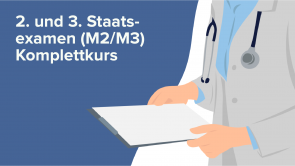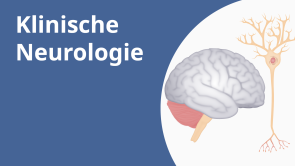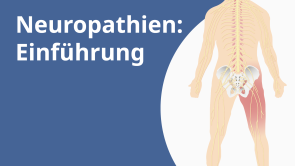Periphere Neuropathie: Herangehensweise nach Lokalisation

Über den Vortrag
Der Vortrag „Periphere Neuropathie: Herangehensweise nach Lokalisation“ von Roy Strowd, MD ist Bestandteil des Kurses „Neuropathien: Einführung“.
Quiz zum Vortrag
What is the most likely location of a lesion in a patient with motor fatigability, intact sensation, and normal deep tendon reflexes?
- Neuromuscular junction
- Spinal root
- Anterior horn cell
- Muscle
- Peripheral nerve
What is the most likely location of a lesion in a patient with weakness, atrophy, fasciculations, intact sensation, and decreased deep tendon reflexes?
- Anterior horn cell
- Neuromuscular junction
- Muscle
- Spinal nerve root
- Peripheral nerve
Which of the following disorders will show early onset of diffuse areflexia in both proximal and distal deep tendon reflexes?
- Guillain-Barré syndrome
- Diabetic polyneuropathy
- Myasthenia gravis
- Muscular dystrophy
- Trauma to the fibular nerve
A patient that has diabetic neuropathy is likely to have which physical findings?
- Weakness and atrophy more distal than proximal, loss of sensation in a stocking-glove pattern bilaterally, and decreased distal deep tendon reflexes
- Weakness and atrophy in a specific nerve pattern, loss of sensation in a dermatomal pattern, and decreased deep tendon reflexes
- Weakness and atrophy in a segmental pattern, no loss of sensation, and decreased deep tendon reflexes
- Fatigability more than weakness, intact sensation, and normal deep tendon reflexes
- Weakness more proximal than distal, sensation intact, and normal or decreased distal deep tendon reflexes
Which of the following is TRUE regarding pain and temperature testing?
- They assess the function of the small peripheral nerve fibers and the anterolateral central nervous system tracts.
- They assess the function of the large peripheral nerve fibers and the anterolateral central nervous system tracts.
- They assess the function of the small peripheral nerve fibers and the dorsal column central nervous system tracts.
- They assess muscular contractile function.
- They are used to primarily assess reflexes.
Diese Kurse könnten Sie interessieren
Kundenrezensionen
5,0 von 5 Sternen
| 5 Sterne |
|
5 |
| 4 Sterne |
|
0 |
| 3 Sterne |
|
0 |
| 2 Sterne |
|
0 |
| 1 Stern |
|
0 |






